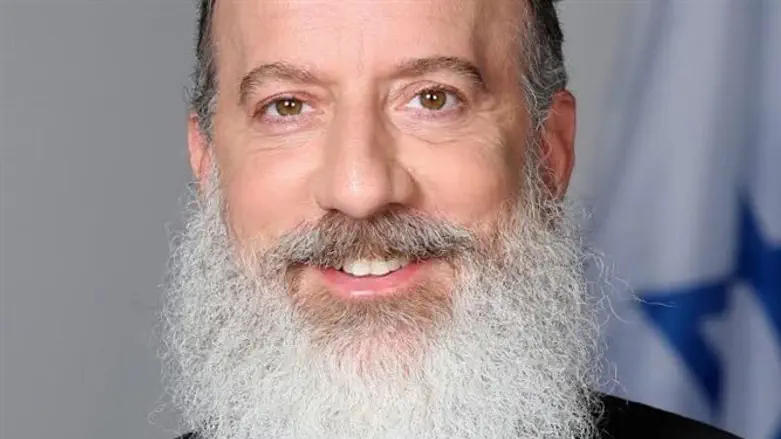
The elections for the Jerusalem City Council will be held on October 30, 2018.
Arutz Sheva presents the answers to three questions posed to the four main candidates for Jerusalem Mayor. All candidates were asked identical questions:
- What sets you apart from your competitors as a compelling reason to vote for you?
- Assuming you win and succeed in advancing and implementing everything on your platform, how do you envision Jerusalem in five years from now, both physically and culturally?
- And what would you say to the English-speaking voter or new immigrant to show them you understand their challenges and situations, and would be their right choice?
The first candidate to respond was Deputy Mayor Yossi Deitch, who currently holds the city's haredi housing portfolio, and serves as deputy to the holder of the planning and construction portfolio.
A recent poll conducted by Camille Fuchs found 41% of respondents would vote for Deitch in a race between seven candidates, giving him a clear victory in the first round of the election.
“I don’t think only within the ‘small haredi box’. I begin every day by consulting with my professional advisors in Jerusalem’s City Hall building. I don’t ask them to come up to me, I go straight down to them as a routine procedure. That’s one difference, that I’m not looking to summon people to my ivory tower but I personally go to wherever things need to be done whether it’s the Sanitation Department, the Building and Construction Department, or any other department it may be. I’ll go there once, twice, three times, four times, until people understand that we need to give answers to the citizens of Jerusalem, and quickly. Today I do it, but I do it as a Deputy Mayor, and I still have instructions from above. As Mayor, I’ll continue to go down there and they’ll understand that the citizen needs to get AAA treatment and to feel like he’s the most important person in the world in that moment.
“When we finish five years we want to see a different situation here in the service to the citizens of Jerusalem. Whether it’s city sanitation - we want to have it clean - the responses to people’s problems in City Hall, licencing businesses in Jerusalem, developing also culture in Jerusalem and the tourism aspects, to bring the uniqueness of Jerusalem.
"People don’t come to Jerusalem from the United States, England, Canada, France, all over, in order to come to another Paris or Tel Aviv. Tel Aviv is a great city, but it’s very similar to other places in the world. When people come to Jerusalem, they come to feel the uniqueness of Jerusalem. Jerusalem is full on the weekends, and it’s full of tourists who are religious and non-religious, and also non-Jewish ones. They want to come to feel Jerusalem, to see Jerusalem the Holy City, and we want to give that to the tourists who come.
“We also want to dedicate a good amount of our time to the newcomers, the Olim Chadashim; they come to City Hall and they don’t know what to do. They don’t know where to go. I want to have someone to take care of that so they’ll feel they have an English speaker, or a French speaker, or a Spanish speaker who they can speak to, and could help them and instruct them and guide them. Once you know what you need to do, it’s much easier to do it.
“I’m a Jerusalemite in my soul, and I want everybody to feel as comfortable as I do. My family is here for seven generations. I have children and grandchildren who are already nine generations in Jerusalem. I want the new immigrant to feel this way as soon as possible, to feel that he’s not a new immigrant, but that he came home.
“In five years I want to see the city cleaner. There are places in Jerusalem where the garbage trucks come only three times a week. That’s insane. Besides that, I’d like the city to look differently culturally, which means I want to give more power to the Community Centers. If you’re talking about building and infrastructure, I want to hear the citizens much more, and for them to be much more involved in running the city, not having the Sherriff on top and deciding what’s good for the city. I won’t always do what the citizens like, but I want to hear them. I want them to be involved. I want them to have a place, and that will be happening directly in City Hall and also through the Community Centers and I want them to be stronger. I want to give them more money for cultural events that are appropriate for the neighborhood and not, as it’s done today, mainly for tourists from outside the city and from the world.
“Besides that I want much more open conversation between everyone. Once there is a haredi mayor, people have to communicate with him, and the tension between the communities will greatly be eased and maybe even disappear.
“It’s funny, this conflict I’m in: I want to build new neighborhoods, and they won’t necessarily be haredi neighborhoods. Most neighborhoods are going to be non-haredi neighborhoods, which means I’m going to change the demographic of Jerusalem, which will make the haredi community a bit smaller. If I want to take away the conflict, I need to build haredi neighborhoods and also non-haredi neighborhoods, with people coming from the outside. The majority should be non-haredi.”
To see Arutz Sheva's interview with Ze'ev Elkin, click here.
To see Arutz Sheva's interview with Ofer Berkovitch, click here.
To see Arutz Sheva's interview with Moshe Leon, click here.